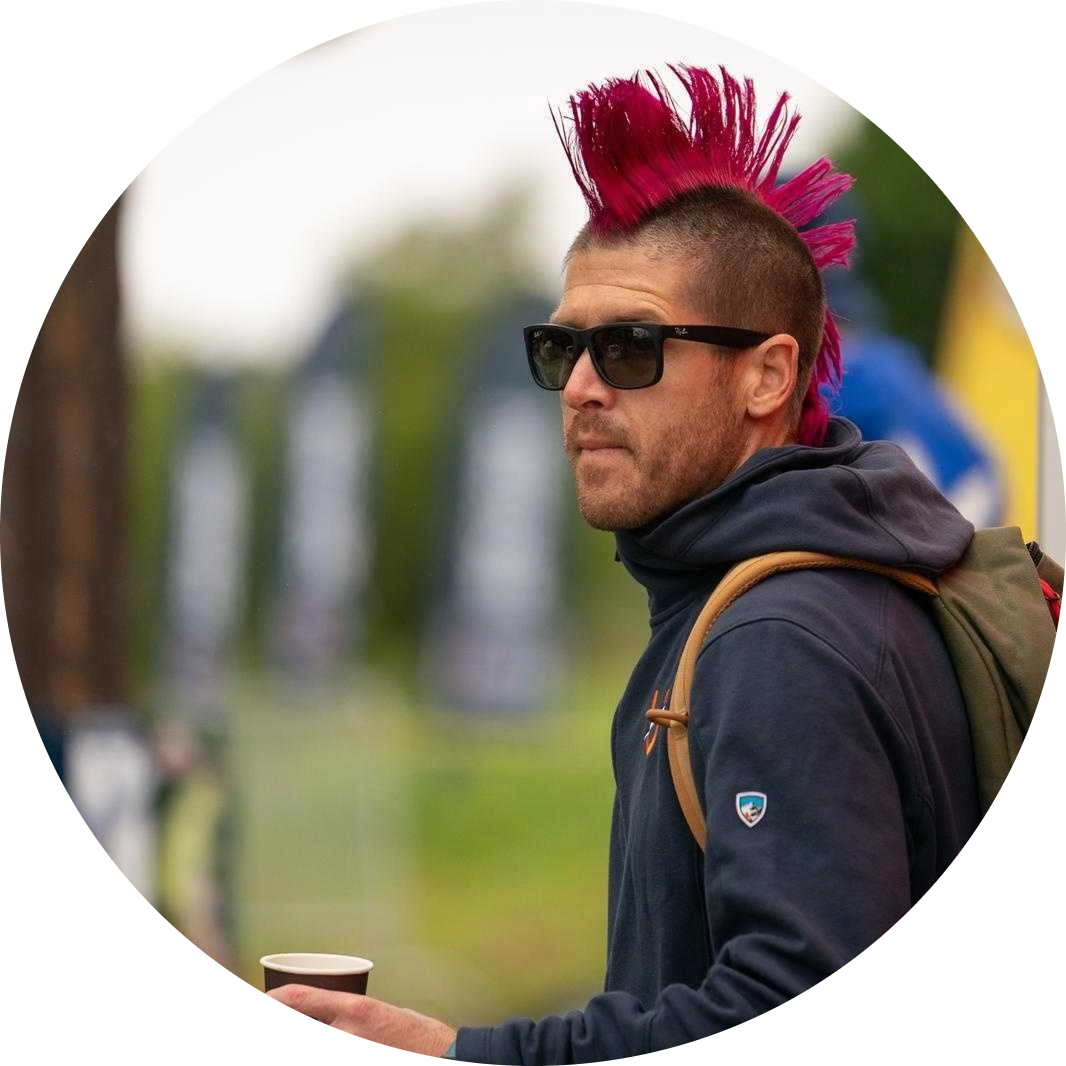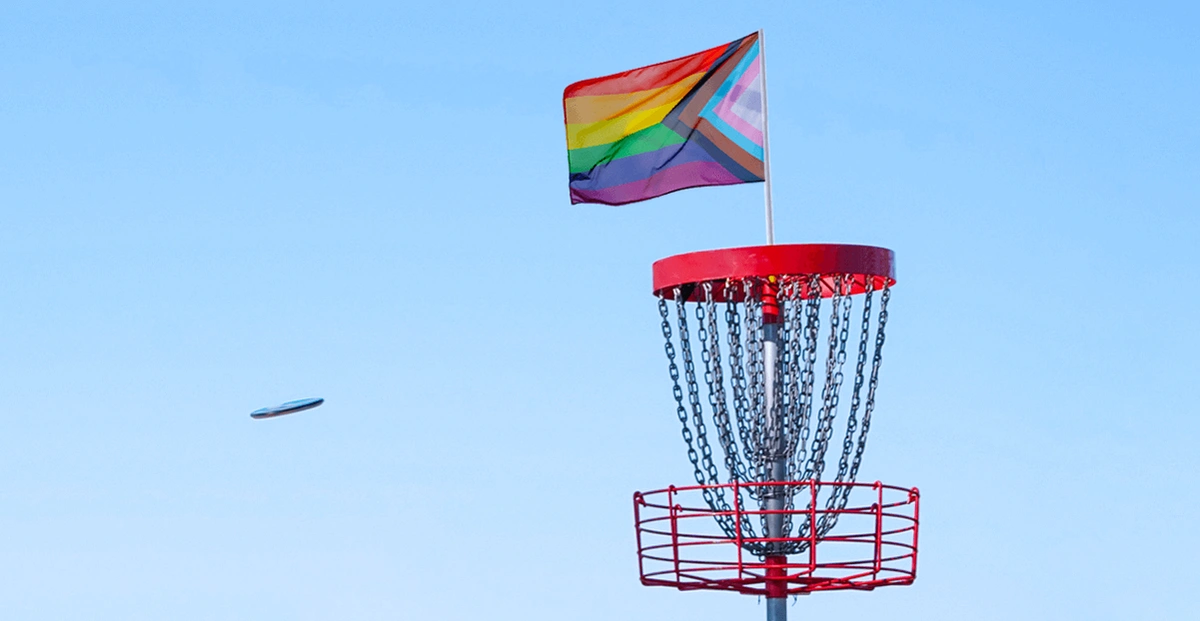One of our core values at UDisc is to include everyone. And while disc golf is often viewed as a friendly, welcoming activity, we can always aim higher. That's why we're celebrating Pride – because we strongly believe that, with LGBTQIA+ rights continuing to be marginalized in various corners of society, it is more important than ever to cultivate an inclusive environment.
With that in mind, we're focusing our efforts in 2023 on ways to build and foster community spaces that reflect our values and demonstrate that disc golf is for everyone.
The Human Rights Campaign, a leading LGBTQ+ advocacy group in the United States, recently declared a state of emergency for members of that community, as more than 75 anti-LGBTQ+ bills have been passed in statehouses nationwide in 2023. So even if you aren't seeing obvious exclusion or homophobic sentiment at your local disc golf course or among your club members, that doesn't mean it isn't happening in the greater community around you.
So what can an average disc golfer who cares about fostering a welcoming atmosphere do to effect change? How can you be an ally to the LGBTQ+ community – in this context, we mean a heterosexual or cisgender player who stands in solidarity with those who identify as queer – while you're out at the course?
It takes time, courage, and habit-building. For those who want to be an ally, or strive to be a better one in the face of headwinds, we have some tips on how to make your disc golf community a better place.
Set the Expectation for Inclusivity From the Start
If you're running a league, tournament, local club, or even a clinic, you have the opportunity to create an inclusive space simply through communication. As an example, look to a fellow disc sport: Ultimate.
Miranda Jaster, one of the captains for Trainwreck, a women's club Ultimate team in Fort Collins, Colorado, that welcomes transgender women and nonbinary athletes, helps set the tone before people even join the squad.
"We start off all our tryouts by stating our values and making it really explicit that we value inclusivity," Jaster said. "People think of inclusivity as a buzzword for racial inclusivity, gender-inclusive teams, and things like that…but it can also include neurodivergent people, people who are differently abled, people who have schedule restrictions. It's something that should transcend categories and shouldn't just be something we talk about only during Pride month."
Part of providing that atmosphere includes asking for players to share their desired pronouns and ensuring that their teammates use them.
"We've been around for awhile, and knowing our membership and knowing our team it's really important for us that we're able to give people a space where they are accepted for all of themselves," Jaster said.
This same philosophy of open communication and respect can be extrapolated to any event in any community that strives to be more inclusive. All it takes is a leader who is willing to set the tone.
You can even start it a step earlier than tryouts or, in the disc golf sphere, the first club meetup: If you're promoting your league event in an internet forum or on UDisc, consider adding language in the event description that addresses the inclusivity guidelines or mentions that it is an LGBTQ-friendly space. Jaster said her club also found success integrating the Progress Pride flag into their team logo.
Read about ways other athletic organizations are supporting LGBTQ+ athletes in our article What Can Disc Golf Learn From Other Sports About Inclusivity?
A Little Visibility Goes a Long Way
Maybe you're not the kind of disc golfer who is running a club or league, but you still want to make the course a more welcoming place. An easy way to do that is through your attire.
It may not be vocal, but outwardly showing your support for the LGBTQ+ community by wearing a Pride-adorned shirt or hat, or affixing a Progress Pride pin or patch to your bag, sends a signal: It shows any queer players who show up at the course, especially those visiting from outside the area, that they have an ally on the ground.
"Merch, like Pride flag stuff, is always helpful, if only an indication that this person might not want to see me not exist anymore," said Jenna Weiner, a transgender disc golfer in the San Francisco Bay Area. "I care about what the people I'm running into might think about my safety."
Touring professional Thomas Gilbert, who came out as gay in 2022, shared a similar sentiment with us last year.
"Similar to how Pride Month promotes inclusion, wearing a Pride shirt has the same effect," Gilbert said. "I feel if I were to see others wearing a Pride shirt, it would make me immediately feel like it was a more inclusive environment. Seeing something just being just worn and realizing there are no issues with it being worn helps. I think it eliminates some of the anxiety around it being an abnormal thing."
Instead of Calling Someone Out, Try 'Calling In'
So far the tips we shared have been pre-emptive in nature. But let's say you end up playing a round with someone you don't know very well, only to find by hole 4 that they are using anti-LGBTQ slurs to describe their or other people's shots. What if you've been put on a tournament card with players that choose to misgender another player in the field?
Joanna Hoffman, Director of Communications for Athlete Ally, an organization whose mission is to "educate and activate athletic communities to eliminate homophobia and transphobia in sports and to exercise their leadership to champion LGBTQI+ equality," acknowledged that it can be uncomfortable to call someone out for using hate speech or otherwise creating a hostile environment.
That's why she suggests an alternate approach: calling in.
"Calling out anti-LGBTQI+ language and behavior often is uncomfortable, but it's necessary to create and sustain a sports culture where we all are safe, welcome and included," Hoffman said via email. "There are ways to address problematic behavior that take a more 'calling in' approach. From this article: When we call someone in, we acknowledge we all make mistakes. We help someone discover why their behavior is harmful, and how to change it. And we do it with compassion and patience."
What might calling in look like on the disc golf course, where competitive juices and a self-officiated culture can often make players wary of pointing out a simple rules violation, much less hate speech? The conversation doesn't have to happen in the moment.
"In this case, that could mean privately approaching a player and saying, 'Hey, I know you may have meant that as a joke. I've learned from talking to people in my life that jokes like that can really hurt people and make them feel unsafe and unwelcome, and I know we want everyone to feel welcome here. I'm happy to talk to you about what's helped me to learn to be more supportive to my LGBTQI+ friends and teammates.'"
Support Companies Who Support the LGBTQ+ Community
Many businesses outwardly support the queer community, not just in June but year-round, through their public statements, hiring practices, and simple branding changes. To this point, though, very few disc golf companies have chosen to recognize Pride.
By patronizing those who do, you can show that your values align with theirs and that you appreciate that they support LGBTQ+ disc golfers. Here's a short list of brands we've seen take part in Pride either previously or in 2023:
Even if you don't want to open your wallet, a simple note of encouragement or a thank you to their support teams or on social media goes a long way. And eventually, as more brands in the sport see that people appreciate their values, hopefully more will feel comfortable supporting the LGBTQ+ community, as well.
Educate Yourself to Facilitate More Productive Conversations
Whether to allow transgender women to compete in gender-protected divisions is a widely debated topic, not just in society at large, but also in disc golf. While emotional appeals often dominate the conversation, having facts at hand can be a helpful way to facilitate more productive discussions.
Here are a couple, in particular, that can be useful if you find yourself having these kinds of conversations on or off the course:
-
The Women's Sports Foundation, an organization founded by tennis great Bille Jean King to "enable all girls and women to reach their potential in sports and life," has spoken out strongly against legislation banning transgender women from athletics:
There are many well documented, known challenges to girls’ and women’s sports, and we welcome all to join WSF in the fight to overcome them. Things like the lack of Title IX understanding and compliance; girls in underserved communities facing inequity in sport access, resources and opportunity; the fight for equal pay; the lack of sponsorship support and media coverage; harassment and abuse of female athletes and women working in sports; and perennial under-recognition of Paralympic women’s sports. These are some of the real challenges to opportunities for girls and women, not the inclusion of transgender girls and women.
-
According to the Trevor Project's 2023 U.S. National Survey on the Mental Health of LGBTQ Young People, 41% of LGBTQ youth considered committing suicide in 2022. Meanwhile, the same organization's 2021 research about sports participation indicated that "many LGBTQ youth who play sports describe sports as supporting their mental health, helping them cope with stress, and distracting them from negative thoughts."
-
A 2022 study commissioned by the Canadian Centre for Ethics in Sport found that, while only three studies had included transgender athletes as subjects, "any potential performance advantages are negated through testosterone suppression after 12 months (and sometimes sooner)." The study also noted that studies used in policy-making should be sport-specific and that transgender women "do not have an inherent athletic advantage over cisgender women."
-
According to the nonpartisan Center for American Progress's Youth Risk Behavior Study, "participation among high school girls remained static from 2011 to 2019 in states with fully transgender-inclusive sports policies, whereas participation among girls in states with outright bans or trans-exclusive policies (combined) has decreased."
Be Patient
Being an ally isn't a one-off occurrence or the rip of a bandaid. Instead, it's a mindset that, not unlike disc golf, requires discipline and patience in order to really make an impact.
It also involves an acknowledgment of the reality that things might not work out how you want them to.
"Allies often want a quick fix," Weiner said. "Tell me the one, two, three, steps – not to say there aren't one, two, three, steps, but often it's far easier to say, 'If you do this, it will solve the problem.' It's much harder to sit with the fact that you can be as much of an ally as you want and it still might not go your way."
Indeed, you have to know that you aren't going to change everyone's mind, or even anyone's mind, on certain topics. But you can still lead by example, and if that makes a difference for even one queer disc golfer, then you've already made the sport a better place.

